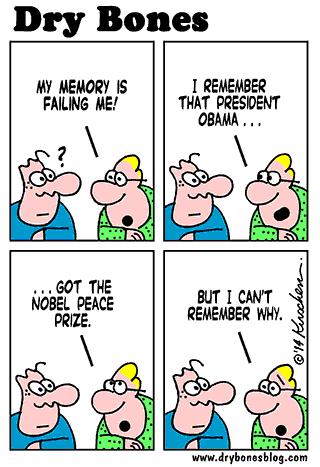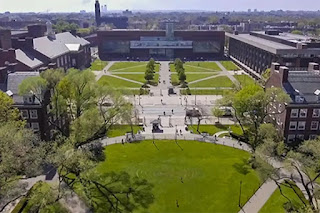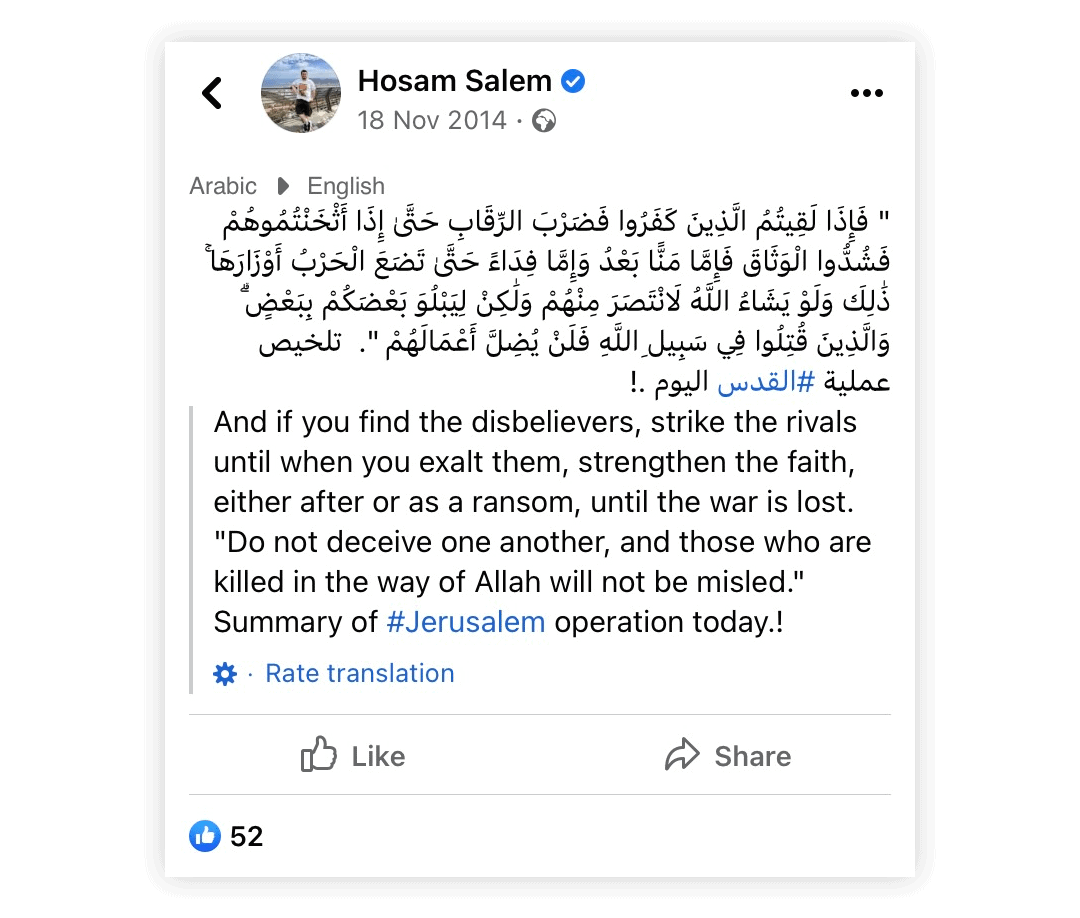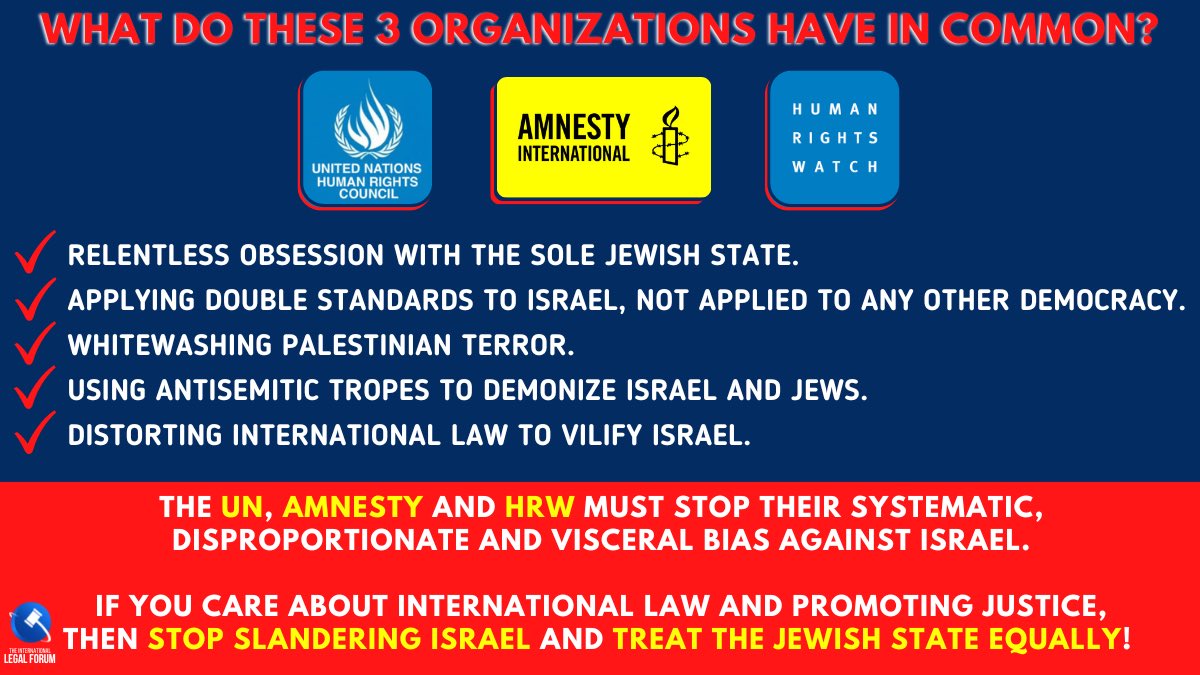By Daled Amos
Just two weeks ago, I wrote about how in May last year, the violence by Hamas terrorists resulted in increased antisemitic attacks on American Jews. In its report, the US Commission on Civil Rights put the anti-Zionism of protesters in context:
The Commission recognizes that individuals have a right to be critical of Israel and the Israeli government; however, anti-Semitic bigotry disguised as anti-Zionism is no less morally deplorable than any other form of hate. [emphasis added]
It's not clear if many noticed this point, that anti-Zionism can be just another form of antisemitism. Universities, for their part, appeared to miss the point entirely -- and still do.
In 2019, as a result of a lawsuit brought by the Lawfare Project alleging discrimination, San Francisco State University agreed to issue a statement affirming
it understands that, for many Jews, Zionism is an important part of their identity.
This apparent landmark development did not stop the president of SFSU the following year from defending the invitation of the terrorist hijacker Leila Khaled to speak there on the grounds of "academic freedom" and "free speech" -- while noting in passing the importance of Zionism to Jewish identity.
The required statement was no magic formula and the words had no effect. There have been no attempts to bring similar lawsuits to encourage recognition of Zionism at other university campuses.
Instead, the situation on campus gets even worse as anti-Jewish groups have gone from toxic speech against Jews to attempts at ostracizing Jews on campus.
Here are 2 examples in the news.
University of Vermont
The Department of Education Office for Civil Rights opened a formal investigation into claims of discrimination and harassment of Jews on the University of Vermont campus:
o May 12, 2021, in response to the ongoing conflict between Israel and Gaza, UVM Empowering Survivors posted on Instagram that it would “follow the same policy with zionists that we follow with those trolling or harassing others: blocked,” going on to say that “we will not be engaging in conversation about . . . Zionism.”
o On May 1, 2021, UVM Revolutionary Socialist Union book club's first Instagram post stated that “No racism, racial chauvinism, predatory behavior, homophobia, transphobia, Zionism, or bigotry and hate speech of any kind will be tolerated.” The complaint further stated that the club’s bylaws “require every RSU member to pledge ‘NO’ to Zionism.”
o On Sept. 24, 2021, a group of “rowdy, intoxicated students” reportedly vandalized the university’s Hillel building for close to 40 minutes by throwing rocks at the upper, dorm portion of the building, and hurled “items with a sticky substance” against the building’s back. UVM administrators did not categorize the attack as a “bias incident,” even though it took place where a large number of Jewish students were known to be.o The complaint also named a university teaching assistant who repeatedly targeted student supporters of Israel on social media. In a series of tweets on April 5, 2021, she wrote:is it unethical for me, a TA, to not give zionists credit for participation??? i feel its good and funny, -5 points for going on birthright in 2018, -10 points for posting a pic with a tank in the Golan heights, -2 points just cuz i hate ur vibe in general.The following month, the TA wrote:“the next step is to make zionism and zionist rhetoric politically unthinkable,” (adding that it should be) “worthy of private and public condemnation, likened to historical and contemporary segregationist movements.”
University of Vermont Responds
After investigating the complaint made Sept. 30. 2021, that two groups excluded from membership students who supported Israel as the homeland for Jewish people, the university determined the groups were not recognized student organizations, received no university support and were not bound by the university’s policies governing student organizations.
The university also investigated allegations that an undergraduate teaching assistant made anti-Semitic remarks and had threatened to lower the grades of Jewish students. The university determined that no grades were lowered and no student reported they had been discriminated against.
Finally, after learning that rocks had been thrown at a campus building where Jewish students lived, police determined small rocks were thrown at the building to get the attention of a friend, and there was no evidence it was motivated by antisemitic bias, Garimella said. [emphasis added]
Garimella missed the point, claiming everything was fine and that the real problem was the investigation itself which "has painted our community in a patently false light."
The action that the university president took with the 2 groups is laughable:
To ensure an inclusive environment within recognized UVM student organizations, student leaders were reminded of university policies prohibiting discrimination on the basis of religion, national origin, or any other protected category. [emphasis added]
There was no condemnation of the exclusion by the groups. Instead, they were "reminded" of the university policies -- policies that Garimella claims the groups don't have to follow anyway.
In his online response, he dismisses the posts by the TA, claiming:
The university took prompt action to ensure that the objectionable statements did not adversely impact students in the classroom and further, to perform a thorough review to ensure all grades were awarded on a non-discriminatory basis. [emphasis added]
So Garimella claims that the comments by the TA are irrelevant as long as grades were not altered. He argues that the hate expressed and the discrimination encouraged by the TA "did not adversely impact students in the classroom" as long as the threats were not carried out.
Garimella's description of the Hillel incident, claiming it was an innocent attempt to get someone's attention fails to address the allegation reported by The Lewis D. Brandeis Center that
When one student whose window had been pelted called out asking the perpetrators to stop, one of the students responsible for the rock throwing shouted, “Are you Jewish?”
Garimella's insistence that the intent was innocent is also contradicted by the claim that a sticky substance was put on the wall of the building.
University of California, Berkeley
The Jewish Journal reports that Berkeley Develops Jewish-Free Zones:
Nine different law student groups at the University of California at Berkeley’s School of Law, my own alma mater, have begun this new academic year by amending bylaws to ensure that they will never invite any speakers that support Israel or Zionism. And these are not groups that represent only a small percentage of the student population. They include Women of Berkeley Law, Asian Pacific American Law Students Association, Middle Eastern and North African Law Students Association, Law Students of African Descent and the Queer Caucus. [emphasis added]
The article is by Kenneth L. Marcus, founder and chairman of the Louis D. Brandeis Center. He describes this current development as going beyond the anti-Jewish discrimination that has long been proliferating on college campuses. Instead of toxic speech being aimed at Jews who stand up for their pro-Israel identity, now Jews themselves are being targeted on campus.
In response to the claim that these groups are allowed to exclude pro-Israel Jews as an expression of the groups' free speech, Marcus quotes Berkeley's dean, Erwin Chemerinsky, who said that the exact opposite is true because these groups have deliberately included anti-Zionist bylaws which themselves limit the free speech of Zionist students.
Marcus goes further, writing that discriminatory conduct -- excluding students who support Israel -- is not protected free speech:
While hate speech is often constitutionally protected, such conduct may violate a host of civil rights laws, such as Title VI of the Civil Rights Act of 1964. It is not always the case that student groups have the right to exclude members in ways that reflect hate and bigotry. In Christian Legal Society [CLS] v. Martinez, the U.S. Supreme Court upheld the right of another Bay Area University of California law school, Hastings College of the Law, to require student groups to accept all students regardless of status or beliefs. Specifically, the Court blessed Hastings’ decision to require Christian groups to accept gay members. [emphasis added]
A Washington Post article at the time quotes Supreme Court Justice John Paul Stevens, who made a comment on the case that seems prescient today:
"Although the First Amendment may protect CLS's discriminatory practices off campus, it does not require a public university to validate or support them," Stevens wrote separately.
CLS forbids those who engage in "unrepentant homosexual conduct," Stevens said, but the same argument could be made from groups that "may exclude or mistreat Jews, blacks, and women -- or those who do not share their contempt for Jews, blacks, and women. [emphasis added]
A university has no obligation under free speech to support a group that discriminates and excludes Jews who support Israel.
University of California, Berkeley Responds
Dean Erwin Chemerinsky was widely quoted as making the point that under the exclusionary criteria of these groups he himself would be banned from the groups as well as 90% of his Jewish students.
Yet despite this, he defended the groups against Marcus.
Chemerinsky claims that the Law School has an "all-comers" policy, meaning that every student group and all student-organized events must be open to all students. He claims he knows of no case where this has been violated or that Jewish students have been discriminated against.
He goes on to complain that Marcus exaggerates the extent of the exclusion of pro-Israel speakers:
But what [Marcus] does not mention is that only a handful of student groups out of over 100 at Berkeley Law did this. He also does not mention that in a letter to the leaders of student groups I expressed exactly his message: excluding speakers on the basis of their viewpoint is inconsistent with our commitment to free speech and condemning the existence of Israel is a form of anti-Semitism.
Finally, it is important to recognize that law student groups have free speech rights, including to express messages that I and others might find offensive.
Like Garimella of UVM, Chemerisnsky plays down the impact of the anti-Zionist actions taken by student groups on his campus.
In response to his numbers game that only a relatively few groups have an exclusionary policy, Marcus responds:
Would it be okay for only 5% or 10% of the campus to be segregated? What percentage of the Berkeley campus should be open to all? Shouldn’t it be 100%? And what is the right number of doors that should be closed to students of any race or ethnicity: isn’t it zero?
On Chemerisnsky's claim that these student groups have a free speech right to exclude Zionists, Marcus draws a key distinction:
Excluding Zionists is not like excluding Republicans and environmentalists. It is not just viewpoint discrimination. If a Democratic club amended their bylaws to prohibit Republican speakers from appearing before them, we could accept their right to do so. We might regret that they are restricting the possibility of dialogue. We might prefer the approach of those law student groups that seek balanced presentations, in order to advance civil dialogue and promote learning. But we wouldn’t consider this to be a civil rights issue.
When persons are excluded on the basis of their ethnic or ancestral identity, however, we must respond differently. [emphasis added]
University indifference to the increasingly virulent exclusion of Jews on campus is compounded by the spread of this new attempt to ostracize Jews to other universities:
Last month, the Brandeis Center and JOC filed a similar complaint with OCR [Office of Civil Rights] on behalf of two Jewish State University of New York (SUNY) at New Paltz students who were also kicked out of a sexual assault awareness group and then cyberbullied, harassed and threatened, over their Jewish and Israeli identities. Currently OCR is investigating complaints filed by the Brandeis Center against the University of Illinois, Brooklyn College, and University of Southern California (USC). And the U.S. Equal Employment Opportunity Commission is investigating a Brandeis Center employment discrimination complaint of anti-Semitism in the DEI program at Stanford University.
1930's Poland
Rafael Medoff writes about a historical analogy to the exclusion of Jews at Berkeley in an article on Berkeley's Version of "Ghetto Benches":
In many universities in pre-World War II Poland, antisemitic faculty and students humiliated Jewish students by forcing them to sit in the back of classrooms. Those areas came to be known as the “ghetto benches.” In some instances, the benches were marked with the first letter of the name of the Jewish student group on campus—a kind of precursor to the Nazi practice (first instituted in German-occupied Poland, in fact) of identifying Jews via a badge or i.d. card bearing a Star of David and the letter “J” or the word “Jude.”
If there were insufficient seats in the back of the Polish classrooms, the Jewish students were made to stand, even if there were empty seats elsewhere in the room. Jewish students who ignored the regulation were often assaulted, and those who boycotted classes in protest were severely penalized. [emphasis added]
In a 1964 article in The Jewish Quarterly Review, "The Battle of the Ghetto Benches," H. Rabinowicz writes about Endek -- the fascist anti-Semitic National Democratic party of Poland. Endek influenced the creation of an anti-Jewish "Green Ribbon" League and pushed for an "Aryan paragraph" that would limit membership and rights to members of the "Aryan race," thus excluding Jews.
Many students succumbed to Endek influence. Warsaw's anti-Jewish "Green Ribbon" League developed rapidly. The nationalists proclaimed "A Week Without Jews", and the Aryan paragraph figured in the new Statute of the Warsaw Polytechnic. It placed the Jews outside the student Code of Honour as persons with whom non-Jews were to have no dealings and who could not even be challenged to duels. [p.154]
Back then, white supremacy was used to exclude Jews on campus.
Today, Jews are accused of being white supremacists.
Anti-Jewish student groups are not picky about the excuses they use to ostracize Jews.
After years of disrupting Jewish and Israeli speakers, and pushing the idea of boycotts, it was only a matter of time before student groups on campus would gravitate towards one more tactic that was successfully implemented in the furthering of Jew-hatred.
|
Or order from your favorite bookseller, using ISBN 9798985708424. Read all about it here! |

|

 Elder of Ziyon
Elder of Ziyon




.jpg)








%20(1).png)
























